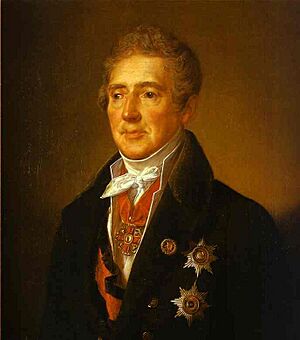Ivan Dmitriev facts for kids
Ivan Ivanovich Dmitriev (Russian: Ива́н Ива́нович Дми́триев; 21 September 1760 – 15 October 1837) was an important Russian statesman and a well-known poet. He was part of the sentimentalist movement in Russian literature, which focused on feelings and emotions.
Dmitriev was born on his father's estate in a place called Simbirsk. When he was young, his family had to leave their home because of a big uprising led by Yemelyan Pugachev. They moved to Saint Petersburg. There, Ivan went to a school for the Semenov Guards and later joined the military.
When Paul I became emperor, Ivan Dmitriev left the army as a colonel. Soon after, he was appointed to important government roles, first as a procurator (a type of legal official) for the senate, and then as a privy councillor, which meant he was a trusted advisor to the emperor.
From 1810 to 1814, he served as the Minister of Justice under Emperor Alexander I. After these four years, he decided to retire from public life. Even though he lived for more than twenty more years, he never took another government job. Instead, he spent his time writing, collecting books, and enjoying art.
Dmitriev's Writing Style and Works
Ivan Dmitriev was a strong supporter of Nikolai Karamzin in how they thought Russian should be written. They worked to make the language simpler and more modern, moving away from the older, more formal Old Slavonic style.
Famous Fables and Poems
Dmitriev wrote many different kinds of poems, including songs, odes (poems praising something), satires (poems that make fun of things), tales, and letters in verse. But he is most famous for his fables. Some of these fables were his own ideas, while others were his translations of popular fables by writers like La Fontaine, Florian, and Arnault.
Many of his songs became very popular because they were easy to sing. He also wrote a short poem about Yermak, a Cossack leader who helped conquer Siberia.
His collected writings were published in several volumes. He also wrote his memoirs, which are like his life story, during his last years. These were published in Moscow in 1866.
English Translation Example
One of his longer poems, "Liberation of Moscow" (written in 1795), has been translated into English. Here is a small part of it:
...And you, our champion, will live for the ages,
As our honor, our glory, and a paragon to all!
There, where the mountains prop up the clouds,
A multitude of sonorous rivers will spring up,
And from the millstone a mighty forest emerge;
Verdant gardens will burgeon upon the plains
And cities will arise and vanish, with time;
An infinity of new marvels nature will create;
Be they revealed to our astonished gaze;
A new light will illuminate the cosmos,
And the warrior, heartened by your blood,
Remembering you, will become in his pride
Greater ingrained, and further, further confirmed
In his unshakable love for our fatherland!
| Preceded by Pavel Lopukhin |
Minister of Justice 1810–1814 |
Succeeded by Dmitry Troschchinsky |
 | Stephanie Wilson |
 | Charles Bolden |
 | Ronald McNair |
 | Frederick D. Gregory |


